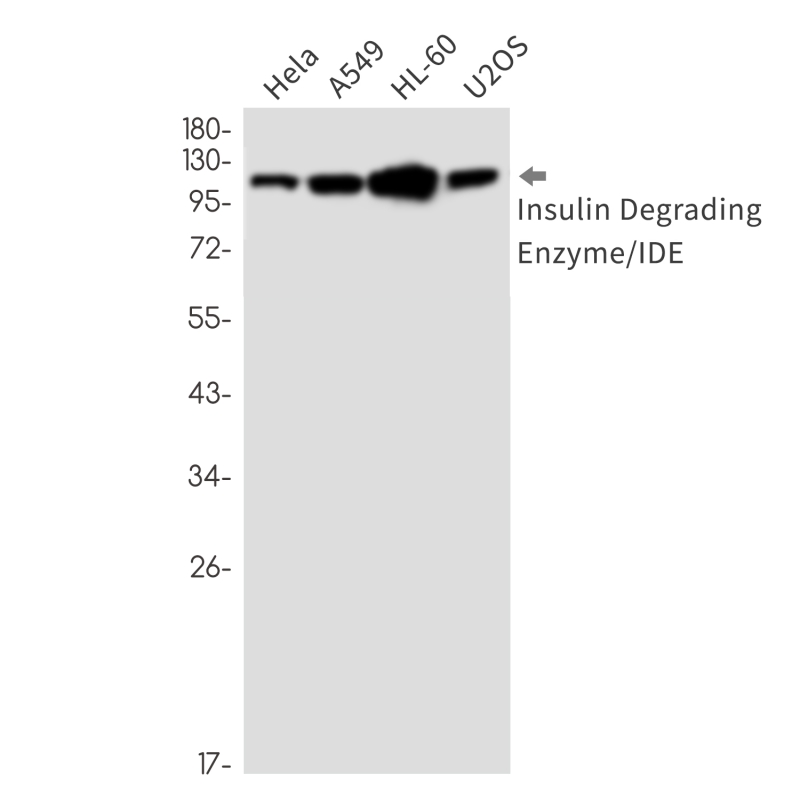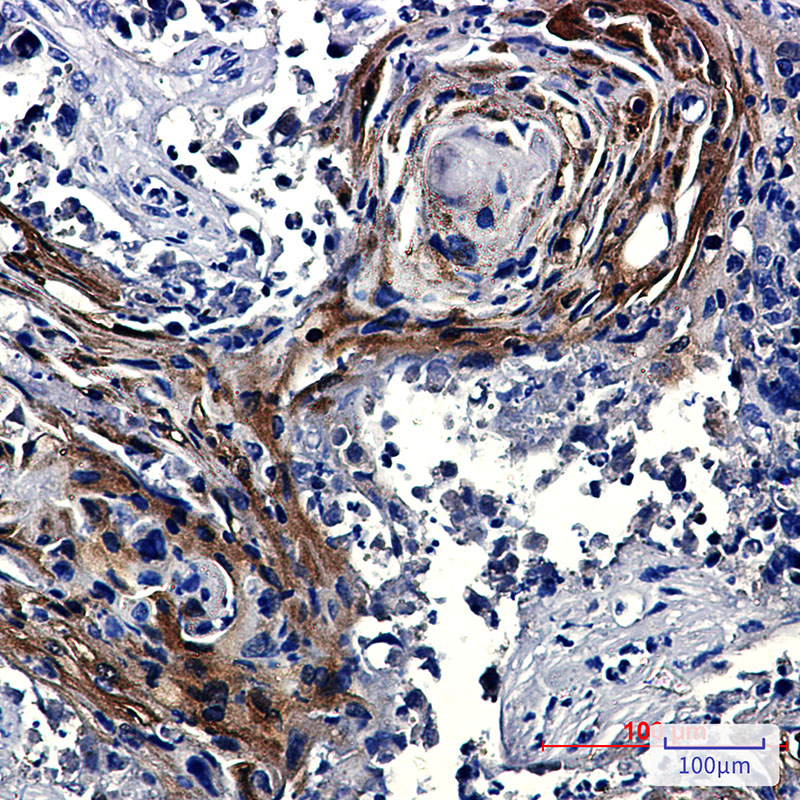

| WB | 1/500-1/1000 | Human,Mouse,Rat |
| IF | 咨询技术 | Human,Mouse,Rat |
| IHC | 1/50-1/100 | Human,Mouse,Rat |
| ICC | 技术咨询 | Human,Mouse,Rat |
| FCM | 咨询技术 | Human,Mouse,Rat |
| Elisa | 咨询技术 | Human,Mouse,Rat |
| Aliases | INSULYSIN; Insulin degrading enzyme; IDE |
| Entrez GeneID | 3416 |
| WB Predicted band size | Calculated MW: 118 kDa; Observed MW: 118 kDa |
| Host/Isotype | Rabbit IgG |
| Antibody Type | Primary antibody |
| Storage | Store at 4°C short term. Aliquot and store at -20°C long term. Avoid freeze/thaw cycles. |
| Species Reactivity | Human |
| Immunogen | A synthesized peptide derived from human IDE |
| Formulation | Purified antibody in TBS with 0.05% sodium azide,0.05%BSA and 50% glycerol. |
+ +
1. **"Insulin-degrading enzyme regulates the levels of insulin, amyloid β-protein, and the β-amyloid precursor protein intracellular domain in vivo"**
*Authors: Farris W, Mansourian S, Leissring MA, et al.*
*摘要:该研究通过Western blot和免疫组化使用IDE抗体,发现IDE敲除小鼠中胰岛素和β淀粉样蛋白水平升高,证实IDE在代谢和神经退行性疾病中的双重作用。抗体特异性通过IDE缺失模型验证。*
2. **"Kinetic and structural analysis of the intracellular domain of the Alzheimer's Aβ-precursor protein"**
*Authors: Leissring MA, Selkoe DJ, Yamin G.*
*摘要:利用IDE抗体进行免疫共沉淀实验,证明IDE直接降解β淀粉样蛋白前体胞内结构域(AICD),并揭示其酶活性的pH依赖性。抗体应用于细胞裂解物检测及功能抑制实验。*
3. **"IDE-deficient mice exhibit glucose intolerance and reduced hepatic insulin degradation"**
*Authors: Shen Y, Joachimiak A, Rosner MR, et al.*
*摘要:通过IDE抗体分析小鼠肝脏和脑组织样本,发现IDE缺失导致胰岛素清除能力下降和糖代谢异常。抗体用于Western blot及组织染色,并通过同源重组模型验证无交叉反应。*
4. **"A cell-based assay for detecting insulin-degrading enzyme inhibitors"**
*Authors: Abdul-Hay SO, Bannister TD, Wang H, et al.*
*摘要:开发基于IDE活性的抑制剂筛选系统,使用IDE抗体验证细胞中IDE蛋白表达水平。研究证实抗体可识别多种物种(人、小鼠)的IDE,并用于高通量药物筛选的功能验证。*
---
提示:以上文献均聚焦IDE抗体的实验应用(如Western blot、免疫组化、功能研究),并强调抗体特异性验证方法(如基因敲除对照)。若需具体实验方案或商业化抗体来源,可进一步补充筛选条件。
**Background of Insulin Degrading Enzyme (IDE) Antibodies**
Insulin Degrading Enzyme (IDE) is a zinc-metalloprotease primarily known for its role in metabolizing bioactive peptides, including insulin and amyloid-β (Aβ). Its function links it to metabolic disorders like diabetes and neurodegenerative conditions such as Alzheimer’s disease, as IDE dysregulation may contribute to insulin resistance or Aβ accumulation.
IDE antibodies are essential tools for studying its expression, localization, and activity in biological systems. These antibodies enable the detection and quantification of IDE in tissues and cell lysates via techniques like Western blotting, immunohistochemistry, and ELISA. They are often designed to target specific epitopes within IDE’s two major domains: the N-terminal substrate-binding region or the C-terminal catalytic site. Many antibodies exhibit cross-reactivity across species, including human, mouse, and rat, facilitating translational research.
Research applications of IDE antibodies include exploring its dual role in metabolic and neurodegenerative pathways, substrate selectivity, and interaction with regulatory proteins. Monoclonal antibodies (e.g., clone 6A1) are valued for high specificity, while polyclonal antibodies offer broader epitope recognition. Challenges include distinguishing IDE from homologous proteases and detecting its secreted or truncated forms.
IDE antibodies also support therapeutic investigations, such as evaluating IDE-targeted interventions to modulate insulin signaling or Aβ clearance. Their utility in both basic and clinical research underscores IDE’s significance as a potential biomarker or therapeutic target in interrelated diseases.
×